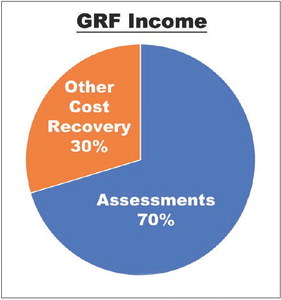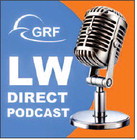Corporate Secretary Carol Levine, who ….


Corporate Secretary Carol Levine, who represents Mutual 10. “So, if we keep pushing these things down the road, in the long run, won’t it cost more to do these projects?” she asked.
“Most likely, yes,” replied GRF Executive Director Jessica Sedgewick.
GRF Director Maureen Habel representing Mutual 3 agreed: “There is a risk in pushing things down the road. . . this year, the physical structure of LW is eligible for Social Security. In three years from now, it will be on Medicare. We are residents of an aging entity.”
Capital Funding and Projects The capital improvement fund is not technically reserves but it is clearly earmarked by internal GRF Policy 40-5340-1 to cover the cost of expenditures for new projects.
Amenity fees, which are influenced by the real estate market, are the only source of funding for capital improvement projects. The proposed budget was passed with 90% going to reserves and 10%, or about $250,000, to capital projects. In 2023, all amenity fees went to the reserve fund.
A capital spending plan, or strategic spending outline, is required by civil code to provide spending priorities for capital funds. The plan loosely prioritizes allocations for specific community projects.
“It’s a fluid and living document and will change as boards change, but it is a starting point,” GRF Senior Director of Member Services Mallorie Hall said.
The Administration Committee recommended the strategic spending outline at its last meeting. The proposal will be discussed at the Oct. 24 GRF Board meeting. The spending outline includes community gardens (formerly the Minifarms), EV charging stations as GRF converts its fleet from gas to electric, building access with staff key cards and turning GRF ID into an access card; traffic flow, a cafe and extended patio in Clubhouse 6, flex space in Clubhouse 2 and bocce ball court improvements, among other items.
Employee Salary and Benefits Employee salary and benefits is historically the largest budget item in GRF spending plans. “It costs money to recruit and train people. We want to attract and retain quality employees,” Hall said.
The GRF currently employs 195 employees, according to HumanResourcesSeniorDirector LeAnn Dillman, who added the GRF has never been fully staffed at 206, with most open positions historically in Security and Transportation, specifically bus drivers.
Staffing in general, and particularly during the COVID-19 shutdowns, is fluid and everchanging. In recent years, GRF was also hampered by belowmarket-rate salaries and found itself training staff, who then left for more lucrative opportunities. Pay grade adjustments and last year’s 5% salary increase companywide has helped ease staffing shortages.
The 2024 budget includes a merit pool, from which exemplary employees receive salary increases, and a 2% cost-of-living bump for all staff. Increased salaries and competitive benefits have already helped stabilize the GRF workforce and led to elevated customer service and smoother operations. Open positions are posted at lwsb.com.
GRF senior staff is working to mitigate rising labor costs by keeping costs low in other areas. For example, it is committed to phasing out costly temporary labor in favor of direct hires and has been closely monitoring insurance and benefits costs.
Group dental, vision, medical insurance rates were way down this year as the company transitioned to MetLife, which offered a significant decrease in premiums, Dillman said. GRF Director Susan Jacquelin noted the decrease, remarking, “That shows that everyone is watching these costs.”
Other Factors Influencing Assessment Hikes
Prices are up in every sector of business, including the GRF. The 2024 budget reflects this with increases in liability insurance rates, contracted labor, audit fees, janitorial and landscape contracts, utilities, hospitality costs, such as water service, coffee, tea, etc., throughout the clubhouses and staff buildings; election expenses, which includes periodic mailout costs related to bylaw amendments and budgets for the GRF and Mutuals; cybersecurity and computer maintenance, and mobile device management so all devices can be unlocked, accessed and reset as staff changes, among many other expenses.
“I want to really thank the committee members, the board of directors and the staff for all the amazing work you have done on the budget,” said GRF Director Susan Hopewell, representing Mutual 6. “I was concerned there was going to be a 20% percent increase (in assessments) and that is down to 10 percent. I thank you all for the hard work that you’ve done.”
Her sentiments were echoed by GRF President Marsha Gerber who emphasized during the meeting how available GRF staffers were to answer questions and give explanations during the weeks leading up to finalizing the budget.
“Thank you to everyone for making this happen,” she said, “especially to Mallorie and Jessica. I know you worked every day on this.”
To learn more about the budget, residents can view the special meeting held Sept. 20 at lwsb.com. GRF staff gave a comprehensive overview of the budget and answered questions posed by GRF directors. The meeting livestream will be available for about 30 days.



